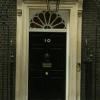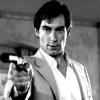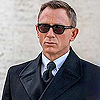The film has so many great things about it, but I must admit I am left somewhat disappointed. The film certainly doesn't measure up to Casino Royale and Skyfall levels. I'll rewatch the film in the Spring, and I'll probably feel a lot more positive about it. Setting out a few thoughts down here, many of which seem harshly critical will help in that process of coming around to it.
The action is the best we've seen in at least a few films. The car chase, particularly, though perhaps zeitgeist following, rather than trend-setting, is beautifully shot against beautiful backdrops. The addition of the phonecall and a few humorous elements break up the rhythm and allow it to get two bites of the cherry in turns of suspense. The opening shot beguiles the mind. Though I spotted what I thought was a subtle CGI blend at the doorway, I can't think how the remainder was achieved. The train fight was another strong moment, though it seemed too casually disregarded. The use of Bond's colleagues to set up multiple, intercut scenes led to one of the most exciting finales in the series.
Whatever MI the team are now (Originally MI7, then MI6, now apparently merely 'the 00 section'), they are great. Fiennes works wonderfully as the older retired agent called back into service, Naomie Harris proves she was a fantastic choice as Moneypenny, and I'm delighted the character is at last scripted with a personal life of her own. Kinnear as Tanner seems unfairly sidelined by the media build up, but then he is by the film as well. The producers clearly saw what a hit they had with Ben Whishaw's Q in Skyfall, and thus he becomes the secondary hero. If public reaction is anything to go on, through his small amount of screentime he has already morphed into the British icon Desmond Llewellyn became.
The plot makes little sense. SPECTRE as an organisation are the fantasy of a conspiracy theorist- they deal in pharmaceutical companies, water companies, intelligence networks, plot terrorist attacks, and plan everything out in meetings of around fifty members around a huge table. Never is a motivation made clear for any of this, nor is the reason why they fear the little man who sits at the far end of the table, the son of a ski instructor. He never even makes a demonstration of his power over them. Unlike in Thunderball where Blofeld fries an agent for embezzlement, it's unclear why Oberhauser wants or allows one of his agents to be chillingly murdered in front of him. It can be said that the 'Special Executive for Counter Terrorism, Revenge, and Extortion' was always a nebulous, never accounted for secret society, but their motivation was always clear, and in the post-2006 era, where everything is supposed to be less silly, I expect explanations. Especially in a film of this length.
Also, and much more obviously left unexplained is how exactly Oberhauser was related to the previous villains. I'll be fair, we can take it as read that Quantum's agents are Spectre's agents. But Oberhauser says he killed M, that Silva was him. But, really? At what point did Oberhauser help Silva? In what way was Silva anyone's puppet? Why does the previous M seem to know about Spectre agents, but not do anything? It's left for the audience to puzzle over, perhaps to stop them wondering at what point Oberhauser said to his henchmen "Do me a favour, print off some pictures of these old associates of Bond and blu-tack them up for me would you? I'm going to stand looking into middle distance behind this glass."
Hmm... Oberhauser. Sorry to say, not a fan of Waltz. A Bond Film depends on a really great villain. It's one of the reasons Quantum of Solace feels the rejected Craig film, with Greene by far the weakest central villain when compared with Le Chiffre and Silva. I find it hard to believe so many can give this man their total obedience. If 'a Dark Bond' was what was wanted, someone with the presence of a Bond was needed. Look through all those dream cast lists, who's too old now? Fassbender, Elba, Isaacs? Dr Swann meanwhile was brilliantly played, and was a good character, though one who diminishes unnecessarily at the end of the film. Whereas Casino takes time to develop the relationship between Bond and Vesper, the 'love' is too sudden. An extra scene or two would have paid dividends. Bautista seemed to be the villain responsible for all the threat in the film, and is dispatched all too soon. Monica Belluci was almost a cameo in the end, but a welcome one.
There's a sense we've seen these things before- and not with Connery or Moore, but in the last three films. We have a denouement in a sterile facility in the middle of the desert which explodes dramatically, just like Quantum of Solace, there's a fight atop a glass skyscraper, as in Skyfall, an opening footchase through crowded streets where Bond refuses to give up his quarry, just as in Casino Royale. The new M yet again under political pressure, Bond bedding a terrorist's wife to gain information, a hall full of world monitoring computer banks, a strapped to a chair torture scene, a meeting of a shadowy cartel in a high class cultural venue, ancient buildings collapsing around Bond, and even a callback to 'I know where you keep your gun', albeit with M instead of Bond. Mendes's directorial touches, such as his out of focus shots, or moody misty landscapes so fresh in the previous film seem overused now.
Even when we're not seeing 'The very best of Daniel Craig's Bond', there's a couple of pieces which seem unoriginal. Andrew Scott's character is not entirely unlike his Sherlock counterpart, and it feels like writers may have taken inspiration from that series for a few dialogue moments. And yes, I'll mention the Fast and Furious style chase scene again. Not that this is to say I didn't enjoy most of these moments. A few here and there I would have loved. I just felt I wanted new things, not old. It's also the first time I've not seen anything new from Craig. I'm not saying he's phoning it in, because he definitely isn't. But the film has less emotion in it, with just the conversation with White and the 'Switch it Off' scene standing out. Of course, this is part of the character's evolution, towards cold, unthinking blunt instrument. Not sure it needs to be that blunt.
Thomas Newman's music continues to grate. His tactic appears to be to fill every possible moment with those suspense strings, to keep the audience constantly on edge. He rarely allows the audience a few seconds of silence, which badly affects the pace of the overlong film. Switching off your brain, you can ignore unexplained plot points. What you can't do is stop sensing the music, and thus this is my least favourite aspect. If Mendes goes I'd wish to see a return to more thematic material of the John Barry style, either back with David Arnold or moving on to Michael Giacchino.
Finally I disliked the tendency towards science fiction, with smart blood, portable scanners that sense DNA from men who died thirty years ago, security services who use giant ticking clocks at the top of glass buildings. The torture scene, though reliant on a simple technique, is made needlessly mechanical, and seems more unpleasant as a result (unpleasant being not necessarily a good thing in an escapist movie). For a globe-trotting adventure there were too many scenes set in dull white rooms, and no moments where our man was able to revel in any of the luxury Fleming would lay on for his hero. Since Skyfall with its richly coloured casinos, grand bazaars, bright city lights and red padded doors in the briefing room, Bond seems to have plummeted into a harsh, sterile world. And sterile is the one thing Bond shouldn't be.








